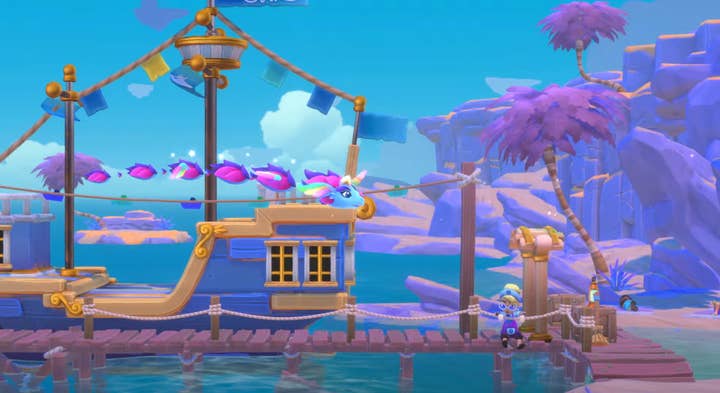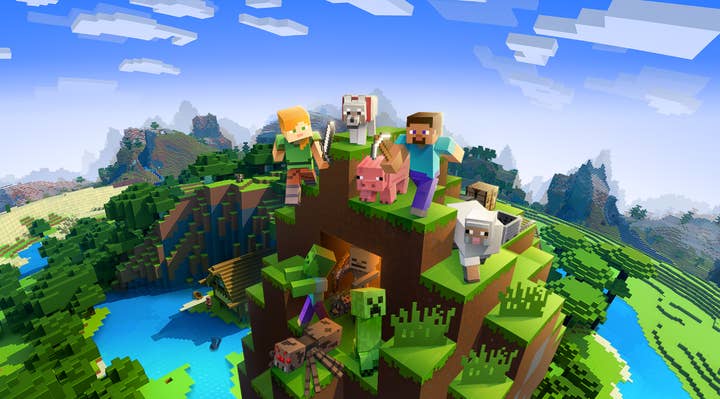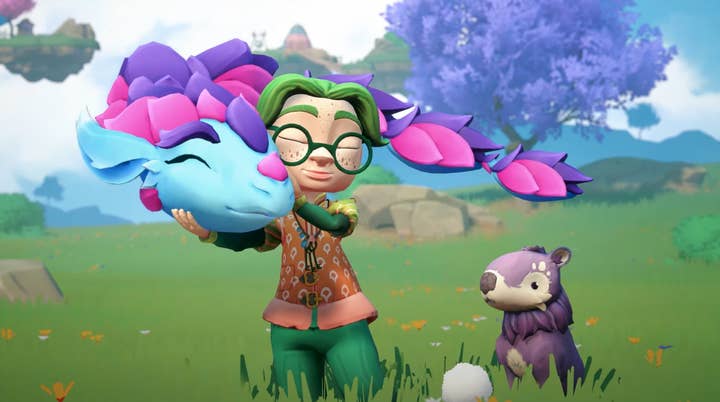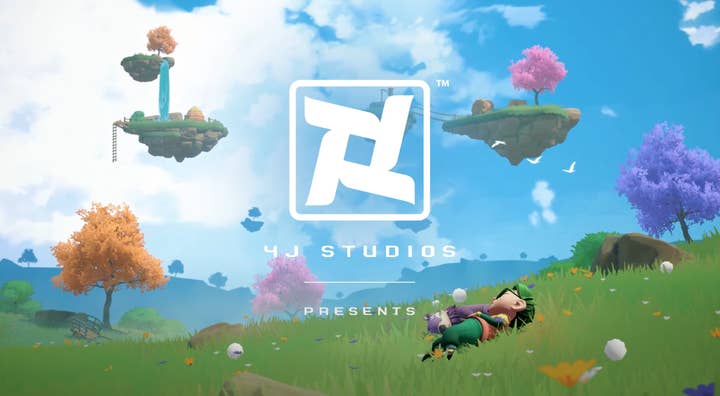4J Studios on its pivot into publishing
The developer best known for putting Minecraft on consoles wants to bring other indies to market, here's how it got there
This week, Scottish developer 4J Studios announced a move into the publishing business, with aims to release independent titles from partners it has been supporting.
For the last decade, 4J Studios' focus has been primarily on Minecraft – the team was responsible for bringing the Microsoft-owned title to multiple PlayStation, Xbox and Nintendo consoles, boosting the game's popularity outside of PC.
In addition to its Minecraft ties, 4J is also linked to Chroma Ventures, a VC fund led by studio co-founders Paddy Burns and Chris van der Kuyl. Now, the developer is seeking to use its own status as a game maker and investor to fuel and launch independent titles as a publisher, with the simple yet effective vision of making games that are for everyone.
.jpeg?width=720&quality=70&format=jpg&auto=webp)
"The whole Minecraft adventure really opened us up to just how well games do when you make them for everyone," van der Kuyl tells GamesIndustry.biz. "The industry can be dogmatic; hardcore gamers want something on the violence metre or sports, and there's a massive audience there. But there's an even bigger audience for games that anyone can play."
Among the small studios Chroma has invested in is Dundee-based Puny Astronaut, the developer behind Skye Tales, which is set to be 4J Studios' first published title next year.
"[Puny Astronaut's] first game was coming through and we said, 'Look, why don't we invest in you, and give you the time and space you really want to make?'" van der Kuyl says.
With investment underway and Skye Tales in development, conversations ensued regarding who Puny Astronaut could partner with to publish, and the suggestion was made that with almost 30 years in the industry, 4J Studios was pretty well positioned to do it itself.
"We heard, 'Look, with 4J, why don't you take that brand out to market? Everybody knows what you've done with Minecraft, let's see where you go now," van der Kuyl tells us.
"One difference for us is that we've got a bit of an audience already, though we're not assuming everyone that has played Minecraft is going to look at our games, nevermind play them. Another difference is that the success of Minecraft has given us the money to invest, which is a real luxury, and we're not taking either of these things for granted."
Van der Kuyl says the blueprint that 4J Studios is leaning towards has existed for years, and he points to Nintendo as the main contributor.
"Nintendo are geniuses at building games that on the surface might be dismissed as 'too young,' but everybody wants them and wants to play them, and that's a vision and mission we'd like to be in a small way," he says. "On a smaller scale, we started looking for development talent that was doing what we were doing 20 years ago, and could maybe learn a bit from us."

While 4J Studios was founded in 2005, Burns and van der Kuyl's relationship with publishers – as well as each other – goes back way further. The pair met in their first year of high school, and have essentially been in business with one another since.
After leaving university, van der Kuyl set up a company straight away, Vis Entertainment. Of which Burns became the CTO. The studio put out titles with publishers like Hasbro and Interplay, but peaked with the release of State of Emergency, published by Rockstar in 2002. While it wasn't exactly a critical hit, it sold 700,000 copies in the US alone, earning $28 million.
Two years later, Vis Entertainment was sold to US publisher BAM! Entertainment, which, as van der Kuyl puts it to GamesIndustry.biz, went ‘bam’ itself in 2005. After that, van der Kuyl and Burns reset themselves and founded 4J Studios ahead of the seventh console generation.
While the company is best known as the one tasked to bring one of the world's biggest titles to billions of console gamers, it had previous porting work with AAA outfits, including Rare, Bethesda and Codemasters. It was this line of work that connected 4J Studios with Mojang.
"The PS3 was notoriously really tough to develop for, and we opened up a niche in kind of technically doing the impossible," van der Kuyl explains.
"We got a call from Peter Zetterberg [now senior director at Microsoft] who said, 'I'm with the Mojang guys, they're desperate to get Minecraft onto consoles.' We thought yeah, the game is pretty cool and it's broken through on PC and mobile, and went to see them. We struck a deal and became the partner for all console versions of the game for the next 10 years almost."

In 2017, Minecraft launched its Better Together update, which essentially rolled all of its multiplayer versions of Minecraft into one single platform, which is where 4J Studios handed over its own console versions.
"We kept doing lots of additional content for Minecraft, and being in that universe for over 10 years is bonkers because there's never been a time in our careers where a game has lasted more than two or three years," van der Kuyl says. "It's been an honour and a privilege to do it, but when we knew Microsoft's strategy was diverging from ours, we knew it was time to do something a bit different."
Van der Kuyl acknowledges that from some perspectives, 4J Studios might just be "the Minecraft studio," and adds that there are even people at the company that have spent their entire working lives just making Minecraft. The studio is proud of this, and doesn't expect to shake the reputation overnight.
"It was really important to us to give the team freedom to explore things that have absolutely nothing to do with Minecraft"
"We can't help the fact, and we're very proud of being as close to Minecraft as we've been, so inevitably, everybody's going to pigeonhole us as the guys who did that," he says.
"It'll be a journey of showing things that are a bit different, and hopefully some things will surprise people. We might hear, 'That's rubbish, go make more Minecraft,' but we've got to concentrate on making games that we believe people are going to love to play."
As such, the company held game jams and spent some of its transitional period trying out new ideas before it landed on its games-for-everyone strategy.
"It was really important to us to give the team freedom to explore things that have absolutely nothing to do with Minecraft," he says.
"We're not going to tell them that people are expecting an open-world sandbox game, so our first game has to be that. Our first game is more likely to be a couch co-op party game, and that's great because it lets the team express their creativity, have fun, and refresh themselves after the last decade. Are we going to use what we've learned from years of Minecraft to create something new? We will, at some point, but that's not going to define us."

4J Studios hasn't positioned itself as a new publisher on the hunt for new projects to work with, its main focus is supporting studios and releasing games that it has invested in over a long period of time. It's not setting up to be a full-service publisher and it doesn't want to take new submissions for existing games looking for a publisher.
"One of the reasons we don't like to just invest in the titles themselves is that it kind of feels like a short-term relationship," van der Kuyl says. "We all know, games are hits-driven, you can all be completely convinced this is the greatest thing ever, and it doesn't quite hit the spot in the market."
"We don't think that should be the beginning and the end of the relationship with a team, because you've got to spend so much time building and learning. We'd rather learn from that and move on to the next one, which is why we like the model of partnering with studios, rather than just the game.
"Unfortunately when those submissions do come in, we'll have to send them back and say that's not what we do. We've set this up to work with the studios that are already in this family. We're not going to preclude new studios from coming in at some point, but it's a different approach to say, picking up a game that's been in early access."
Van der Kuyl nods to Team17, of which he is an investor and former non-executive chairman. He notes that the sign of a maturing industry is that lots of publishers with similar goals and audiences can co-exist rather than rival one another.
"We're part of a community and an industry that's seeing huge growth, and there's room for all of us"
"Team17 knocks the lights out with those kinds of partnerships and relationships," he says. "But they're set up to do that, and that's not what 4J is going to be. It's not one-size-fits-all anymore, and we want to make sure people understand that while we've got huge ambitions for what we want to do, it's a different model to some publishers. We're part of a community and an industry that's seeing huge growth, and there's room for all of us."
Van der Kuyl is also honest about 4J's knowledge and capabilities, despite decades of experience in the industry, and setting up a publishing arm is not a decision that the studio took lightly.
"We've spent months, if not years considering if this is the right thing to do, do we have the skills to do it, and we've come to this conclusion that while we don't know everything, we know our titles better than anyone else does," he says. "We've been submitting on multiple platforms for decades, so we understand the mechanics of that side."
What's also been amazing is the big platform holders have been so open and friendly towards us and asking what they can do to help, and that's been really encouraging. It's a big adventure for us, and we're delighted to get moving and see where it takes us."

